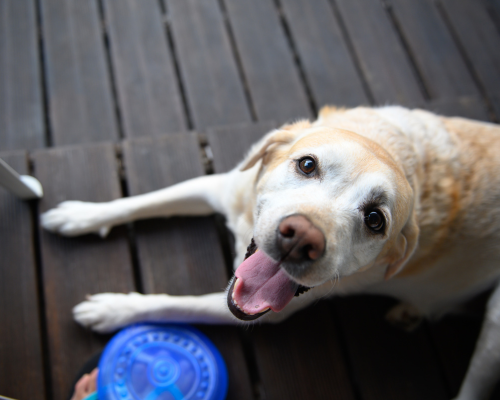Why Do Dogs Age So Fast? Explained
Why Do Dogs Age So Fast? Explained

Vet Reviewed

By: Sarah Hodgson
December 10, 2023
Table of Contents
You may have noticed that dogs tend to grow old much faster than us humans. If your a dog owner it can be quite disheartening to see your dog age rapidly, but have you ever wondered why dogs age so fast?
In this article, we will explore the factors that contribute to this rapid aging process in dogs and shed light on why some breeds age faster than others.
So let's dive in!
Quick Answer:
Dogs age faster than humans due to their faster metabolisms and higher heart rates. This accelerated aging process results in shorter lifespans and quicker maturity. For every one dog year, it's estimated to be around seven human years.
Understanding the Aging Process in Dogs
To understand why dogs age so fast, it is essential to grasp the basics of the aging process.
Like humans, dogs undergo physical and physiological changes as they grow older. These changes manifest in various ways, including graying hair, decreased energy levels, and a decline in overall health. However, dogs experience these changes at a much faster rate than humans, making their aging process appear accelerated.
One key reason why dogs age faster is their metabolism. Dogs have a higher metabolic rate than humans, meaning their bodies work harder and age quicker. This increased metabolic rate results in a faster wear and tear of their body tissues, leading to visible signs of aging at an earlier stage.
Note
Research has shown that the dog aging process is influenced by a variety of factors, ranging from genetics to environment. For example, certain breeds are known to age faster than others. Also, the size of the dog plays a significant role in how quickly they age, with larger breeds generally aging at a faster rate.
Let's go over those factors that affect dogs aging now.
The Factors that Contribute to Rapid Aging in Dogs
Several factors contribute to the rapid aging in dogs. Below we go over the six most influential ones.
Faster Metabolisms
Dogs possess metabolisms that operate at a quicker pace than humans, leading to accelerated physiological processes.
Higher Heart Rates
The canine cardiovascular system works harder, contributing to a shorter lifespan compared to humans.
Genetic Factors
Breed-specific genetics play a role in the rate of aging, with some breeds predisposed to age more rapidly.
Size Matters
Smaller breeds generally have longer lifespans, while larger breeds tend to age more quickly and have shorter life expectancies.
Environmental Influences
Diet, exercise, and overall care can impact a dog's aging process, with neglect or poor health practices contributing to faster aging.
Hormonal Variations
Differences in hormonal levels and cycles between humans and dogs contribute to the rapid aging phenomenon.

Why Do Dogs Age So Fast?
Now to the million-dollar question: why do dogs age so fast?
The exact reason remains a mystery, but scientists believe it has to do with the way dogs have evolved over time. Dogs, especially larger breeds, grow very rapidly in their early years, which might lead to faster cell deterioration and consequently, a shorter lifespan.
Moreover, the fast aging process in dogs could also be attributed to their metabolic rate as we mentioned above. Dogs have a higher metabolic rate than humans, which means their bodies work harder and use up energy faster. This could potentially lead to faster aging.
Comparison of Dog Years to Human Years
We all know the saying that one dog year equals seven human years however, that is just a rough approximation at best. In reality, the comparison of dog years to human years is much more nuanced. For instance, a one-year-old dog is equivalent to a 15-year-old human, but by the time a dog reaches two, it's comparable to a 24-year-old human. After that, each dog year equals about four to five human years.
Which Breeds of Dogs Age Faster Than Others?
While all dogs age faster than humans, certain breeds tend to age more rapidly than others. Some of the breeds that are known to have a shorter lifespan and age faster include:
- Great Danes
- Bernese Mountain Dogs
- Boxers
- Saint Bernards
- Labs
On the other hand, smaller breeds such as Chihuahuas, Dachshunds, and Toy Poodles tend to have a longer lifespan and age at a slower rate. It is important to note that there are exceptions within each breed, and individual factors such as genetics and overall health also play a significant role in determining a dog's aging process.
The reason large breeds have a shorter lifespan than small breeds is still under scientific investigation, but one theory suggests it's due to their rapid growth. Large breeds grow very quickly in their early years, which can put a lot of stress on their bodies, leading to faster aging.

Health and Lifestyle Choices for Slowing Down the Aging Process in Dogs
While the aging process in dogs cannot be stopped entirely, there are steps you can take to slow it down and ensure your furry friend enjoys a longer and healthier life. One crucial aspect is nutrition. Providing your dog with a balanced and nutritious diet is essential for their overall health and can help slow down the aging process. Consult with your veterinarian to determine the best diet for your dog's specific needs.
Regular exercise is another vital component of keeping your dog young and healthy. Physical activity helps maintain muscle tone, keeps joints flexible, and supports overall cardiovascular health. Engage in activities such as daily walks, playtime, and interactive games that stimulate both their mind and body.
How To Help Your Dog Enjoy a Long and Happy Life
In addition to nutrition and exercise, there are several other ways to help your dog enjoy a long and happy life. Regular veterinary check-ups and vaccinations are essential for early detection and prevention of potential health issues. Maintaining good oral hygiene by brushing your dog's teeth regularly can also contribute to their overall health and longevity.
Furthermore, providing a safe and stimulating environment is crucial. Dogs thrive when they have a comfortable living space, mental stimulation through toys and puzzles, and a loving and nurturing environment. Spend quality time with your dog, engage in training sessions, and provide plenty of opportunities for socialization.
The Bottom Line
So there you have it, while dogs may age faster than humans, understanding the factors that contribute to their rapid aging can help us make informed decisions to promote their well-being and longevity.
Genetics, size, and lifestyle choices all play a significant role in the aging process of dogs. By providing proper nutrition, regular exercise, and a loving environment, you can help your furry companion enjoy a longer and happier life.

Subscribe to Petfluence!
Get updates on the latest posts and more from Petfluence straight to your inbox.